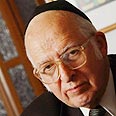
Rabbi Aharon Lichtenstein
צילום: אלכס קולומויסקי
Har Etzion rabbis speak out against soldiers' protests
Heads of Har Etzion Yeshiva issue statement saying 'Yeshiva students are soldiers, with all this implies, are obligated to display complete loyalty to military.' Yeshiva to work to establish joint IDF-yeshiva body to deal with points of conflict between military orders and halacha
Heads of the Har Etzion Yeshiva in Alon Shvut on Tuesday published a statement following incidents of hesder yeshiva soldiers protesting against settlement evacuation.
Rabbis Aharon Lichtenstein, Yehuda Amital, Baruch Gigi, Moshe Lichtenstein, and Yaaqov Medan, said in their statement that they object to any political displays in the military and that any yeshiva students to take part in political protests in the army will be dealt with severely.
The rabbis, who are considered among the moderates of the hesder yeshivas, stressed in their document, which is to be distributed to thousands of yeshiva graduates that "the yeshiva considers itself part of the people residing in Zion, and considers the strength of the State of Israel and the IDF a very important value."
According to the rabbis: "The yeshiva students are soldiers, with all this implies, during their military service, and are obligated to display complete loyalty to the military and its command."
The rabbis stressed that in the event of receiving an order that goes against a soldier's conscience, the soldier in question must 'walk between the drops' and avoid, as much as possible, any conflict between the military orders and the mitzvoth of the Torah and halacha.
"The yeshiva instructs its students, as a general policy, to try and minimize the strife as much as possible, and reach solutions that are compatible with the halacha on the one hand, and the military's ability to function in an acceptable manner on the other hand," the statement said.
The yeshiva stated that it, together with the Hesder Yeshiva Association, would work to build a joint mechanism with the IDF to treat such tense points, "in cooperation, mutual respect, solidarity, and a desire to work the problem out rather than make bigger.
"Such points of friction are very few, and they are not enough to have an impact on the hesder yeshiva soldiers' practical and principle commitment and loyalty to the military and its command."
With regards to the cancellation of the Defense Ministry's arrangement with the Har Bracha Yeshiva, the rabbis stressed that since Har Bracha head Rabbi Eliezer Melamed's signed a document composed by the Hesder Yeshivas Association following the affair, his yeshiva should be included in the arrangement once again as soon as possible.
Rabbi Yaaqov Medan, who is seen as a relatively extremist yeshiva head, also signed the document but added a reservation about the mildness connoted by the word "evacuation".
He said the settlements were being uprooted and that the word "evacuation" should be "uprooted from the lexicon dealing with the destruction of people's homes and throwing them out onto the streets".
"The melody arising from the letter is one-sided in my opinion. It does not mention the significance of breaking people, uprooting them, and dragging them from their homes by the IDF or with its help," Medan said.
He claimed that while he does not condition his support for the IDF on its refraining from controversial policing missions, he objects to the document's lack of criticism for the Defense Ministry's policies on such matters.
Medan also objects to the leniency the ministry shows for academic institutions "whose professors condemn the IDF… and while it continues to send them its officers for schooling and advanced studies, treats with a total lack of leniency Rabbi Melamed".










